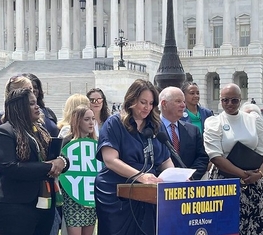LWV Guest
While abortion justice is necessary for the people of DC, our lack of statehood means we have little control over the future of reproductive rights. Until DC becomes a state and has, like all other states, the ability to make its own laws and policies, we remain subject to the oversight of Congress.
On Aug. 2, 2022, Kansas will be the first state in the nation to vote on the issue of abortion since the Supreme Court of the United States overturned Roe v. Wade on June 24. The League of Women Voters of Kansas (LWVK) strongly opposes this amendment.
Carbon emissions are causing widespread and potentially irreversible damage to the environment — and also have a significant impact on the economy.
While some people rationalize our failure to decrease emissions by keeping that the actions needed to do so would hurt the economy, the costs of doing nothing are even higher and are increasing with every day of inaction.
The Voting Rights Act was originally passed in 1965 as one of the chief legislative accomplishments of the civil rights movement. Since then, it has safeguarded the right to vote, guarding against discriminatory voting practices such as literacy tests and racial gerrymandering.
But the VRA is on shaky footing in 2022, facing opposition both in Congress and at the Supreme Court.
But the District of Columbia is not a state. Why is that a problem? Because of not being a state, the District of Columbia does not have any rights unless they are specifically allowed by Congress, since Congress exercises “exclusive Legislation in all Cases whatsoever” over the Seat of Government of the United States. In other words, unless we have statehood, we don't have access to the rights that the current 50 states enjoy.
There are many different roles election workers can play, from ensuring that polling places are accessible for those with disabilities to counting ballots to running a polling site.
To learn more, we interviewed Pinny Sheoran, president-elect of the League of Women Voters of Arizona, Isabel Longoria, former League of Women Voters of Texas Board member and current Harris County elections administrator, and Debra Cronmiller, executive director of the League of Women Voters of Wisconsin, both of whom have extensive experience as election workers.
March 26th marks the anniversary of the landmark Rucho v. League of Women Voters of North Carolina (also known as Rucho v. Common Cause) Supreme Court oral arguments. The Supreme Court's ultimate decision, that federal courts cannot make determinations on partisan gerrymandering, would have major consequences for representation across our democracy.
We spoke with Allison Riggs, who was chosen to represent the plaintiffs and argued the case before the Supreme Court. Now, Riggs, who is now co-executive director and chief counsel for the Southern Coalition for Social Justice, gives us her first-hand account of what happened in the courts.
In the US, most people take for granted that ample food and clean water are, and will be, available for consumption. Yet climate change has already impacted food and water resources here and around the world.
The pro-voter Fannie Lou Hamer, Rosa Parks, and Coretta Scott King Voting Rights Act Reauthorization and Amendments Act of 2006 moved quickly through Congress with strong bipartisan support. The speed of passage showed our country’s bipartisan support of voting rights, support which has dwindled in recent years -- as seen with the John Lewis Voting Rights Advancement Act.
Although the largest impacts to limit climate change will come from countries and corporations, individuals can make a difference as well, especially by applying pressure and sharing their thoughts with elected officials. What can we do today to make a difference?





